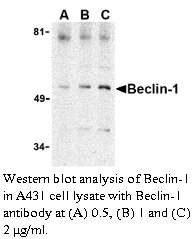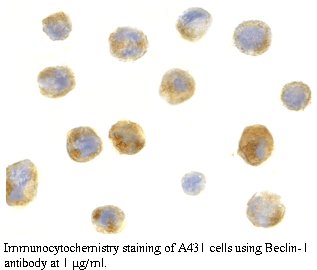Anti-Human Beclin-1 (CT)
Data
- -
- -
Antibody DetailsProduct DetailsReactive Species Human Host Species Rabbit Immunogen PN:B482 Product Concentration 0.5 mg/ml Formulation This polyclonal antibody is formulated in phosphate buffered saline (PBS) pH 7.4 containing 0.02% sodium azide as a preservative. Storage and Handling This polyclonal antibody is stable for at least one week when stored at 2-8°C. For long term storage, aliquot in working volumes without diluting and store at –20°C in a manual defrost freezer. Avoid Repeated Freeze Thaw Cycles. Country of Origin USA Shipping Next Day Ambient RRIDAB_2828209 Each investigator should determine their own optimal working dilution for specific applications. See directions on lot specific datasheets, as information may periodically change. DescriptionDescriptionSpecificity Rabbit Anti-Human Beclin-1 recognizes an epitope near the C-terminus of human and mouse Beclin-1. This polyclonal antibody was purified using affinity chromatography. Background Autophagy, the process of bulk degradation of cellular proteins through an autophagosomic-lysosomal pathway is important for normal growth control and may be defective in tumor cells.1,2 Beclin-1, a coiled-coil Bcl-2-interacting protein homologous to the yeast autophagy gene apg6,3,4 is a mammalian autophagy gene that can inhibit tumorigenesis and is expressed at reduced levels in human breast carcinoma, suggesting that defects in autophagy proteins may contribute to the development or progression of tumors.5 Bcl-2 can bind to Beclin-1 and inhibit Beclin-1-dependent autophagy in yeast and mammalian cells, suggesting that Bcl-2 functions as an anti-autophagy protein as well as an anti-apoptotic protein, which helps maintain autophagy at levels that are more compatible with cell survival rather than cell death.6 PubMed References & Citations1. Gozuacik D and Kimchi A. (2004) Oncogene. 23:2891-906. 2. Kisen, GO. et al. (1993) Carcinogenesis 14:2501-5. 3. Liang, XH. et al. (1998) J. Virol. 72:8586-96. 4. Kametaka, S. et al. (1998) J. Biol. Chem. 273:22284-91. Technical ProtocolsCertificate of Analysis |
Related Products
- -
- -
Prod No. | Description |
|---|---|
B451 | |
B452 | |
B482 | |
B483 |
 Products are for research use only. Not for use in diagnostic or therapeutic procedures.
Products are for research use only. Not for use in diagnostic or therapeutic procedures.




